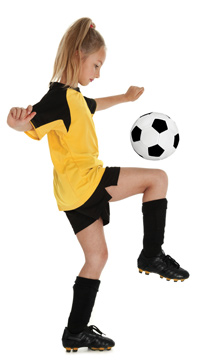HCM & Sudden Death: Is Your Child At Risk?
If you are a sports fan, or an avid news watcher, you have undoubtedly heard the tragic stories of a young athlete who dies on the field or at practice. In most cases, the culprit of these sudden deaths is Hypertrophic Cardiomyopathy (HCM).
“HCM is a genetic disease which causes.an abnormal thick-ness in the bottom chambers, or ventricles, of the heart. This can impair the flow of blood into and out of the heart,” explains Matthew Martinez, MD, the director of the Sports Cardiology and Hypertrophic Cardiomyopathy program at Lehigh Valley Health Network.
Although HCM is the most common cause of sudden death in athletes, it doesn’t stop there. “HCM affects about one in 500 people. It is the most common cause of cardiac arrest in people under the age of 25 – athletes or not – and accounts for about 40 to 50 percent of all deaths in that age group,” says Martinez.
To a parent, these numbers can be quite startling. While there is no way to prevent or cure HCM, an early diagnosis can save your child’s life.
In the case of young athletes, many sports programs have been incorporating cardiovascular assessment to clear children for sports participation. This assessment not only looks at cardiovascular and physical health, but also family history to evaluate the child’s predetermined health risk factors, such as HCM. The newly signed Pennsylvania Act 59 now requires education of coaches, trainers and athletes regarding the sudden cardiac arrest.
The Sports Cardiology Program at Lehigh Valley Health Network offers evaluation and treatment of cardiac symptoms that may cause HCM. Along with cardiopulmonary exercise tests, a sports nutrition consultation and lab work, tests such as an electrocardiogram, echocardiogram or magnetic resonance imaging (MRI) of the heart can help doctors determine if your child has HCM or another cardiac condition.
What Are The Symptoms?
Many young people who have HCM may appear to be heart healthy. However, they
may experience:
• Shortness of breath
• Chest pain, especially during exercise
• Fainting, especially during exercise
• Dizziness
• Fatigue
• Rapid, fluttering or pounding heart
“If you are a younger person exercising regularly and you are feeling just as labored and weak in your tenth week, as your first week, and are unable to keep up with your peers, you may want to come in to the office and visit your physician,” Martinez suggests. “Especially if you have had any passing out spells during exercise, that’s concerning.”
My Child Has HCM – Now What?
Most people who are diagnosed with HCM live normal and healthy lives and are able to participate in sports activities with the consultation of a doctor. However, some patients require further treatment for their condition. Medication that stabilizes and slows the heart can be helpful. By using these medications, it can improve the blood flow in the heart. This will reduce a patient’s symptoms and improve their quality of life.
“Every one to two years, we will send patients with hypertrophic cardiomyopathy home with an ambulatory electrocardiogram. It is an electrocardiogram that you wear on your chest for 24 hours, or up to 48 hours, in order to see all of the extra beats. We want more than just a few hours in order to get more than a snapshot of what’s really going on,” says Martinez.
For extreme cases, an open-heart surgery procedure, called a myectomy, may be performed to reduce the thickness in a patient’s heart, which can diminish symptoms completely.
While hypertrophic cardiomyopathy can come on suddenly, programs such as the Sports Cardiology and Hypertrophic Cardiomyopathy program at the Lehigh Valley Health Network can help. For more information, visit The Hypertrophic Cardiomyopathy Association website at 4hcm.org. or visit Lehigh Valley Health Network’s website at lvhn.org and search Hypertrophic Cardiomyopathy.





